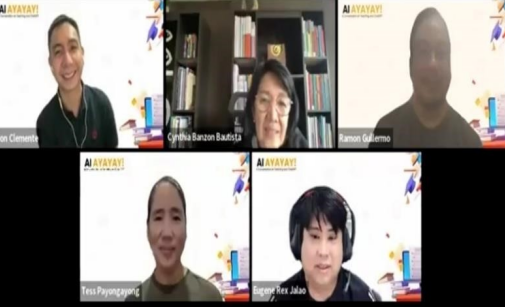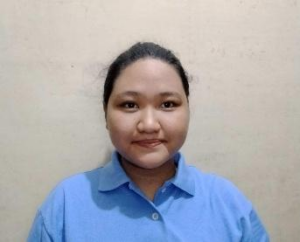by Cathlyn Ann T. Herrera
A virtual roundtable discussion webinar facilitated by the University of the Philippine (UP) Diliman Office for the Advancement of Teaching, “AI AYAYAY!: A Conversation on Teaching and ChatGPT,” was posted through a Facebook live stream last Monday, February 13th.

The main panelists: Dr. Cynthia Rose Bautista; UP Vice President for Academic Affairs, Dr. Ma. Theresa Payongayong; UPD Vice Chancellor for Academic Affairs, Dr. Rex Jalao; coordinator of the UPD Artificial Intelligence Department, and Dr. Ramon Guillermo; representing UP for International Studies Department and one of the pioneers of Digital Humanities in the Philippines, with host and moderator, Ton Clemente.
The two-hour discussion focused on the emergence of ChatGPT as an Artificial Intelligence in general and brainstorming the best solution to address its effect on the higher education sector. The event was open to the public since one of the program’s objectives was to engage panelists and participants in an interactive discussion through a symposium while giving outside viewers a chance to give their own suggestions on the matter.
The program was designed to be a Q & A portion to which the panelists answer depending on their expertise on the subject. The interesting part was that the series of preliminary questions which were assigned to be answered by the panelists were revealed by ChatGPT itself. Sir Ton jokingly commented that this set-up was somewhat a “Senate inquiry in aid of legislation” since Google was also reported to be in the experimental stage of their own AI chatbots so it is most likely that soon, Artificial Intelligence (AI) tools like ChatGPT will be prominent.
ChatGPT according to Dr. Jalao, is an intelligent chatbot that gathers data from a massive dataset which is a compilation of information from books, and websites, among others and, it answers with historical accuracy and correct grammar. In its essence, Sir Clemente mentioned it’s similar to AI-generated customer services platforms like Shopee, putting GPT simply for viewers not familiar with it. To broaden our perspective about AI in general, Dr. Guillermo, shared that usually, sports articles that we saw published in journals and prestigious publications were actually machine-writable texts to make the news fresh and it jumps the lengthy process of editing and proofreading.

The webinar was held last February 13th, via Zoom.
Sir Clemente remarked that “the possibilities that AI can provide are seemingly endless.” But Dr. Guillermo stated that “ChatGPT is an example of a disembodied AI in this language-based world.” This means that it can gather information but never experience since it was limited only to language. Due to that, he implied that it was a good move to work on embodied pedagogy while explicitly making students aware of ChatGPT by integrating it into education. Dr. Payongayong, on the other hand, was asked about the safeguards and the need to create copyright policies given the situation. But she clarified that the university had existing guidelines on copyrights, plagiarism, intellectual property, and intellectual dishonesty and students were expected to be well-informed about it. Dr. Cynthia added that ChatGPT-generated texts would not be detected by plagiarism checkers because they can provide different answers to the same questions. The fear for this tool was heightened since AI was known to evolve and develop consistently so it has the ability to transcend its own shortcomings in the future.
Dr. Guillermo added that with the same line of thought, it was pointless to produce AI checkers because ChatGPT will gradually become better at mimicking human-produced texts and will make it less error-prone. Due to our current standing, it is best “to root out human AI-like text instead of rooting out AI with human-like text.” He emphasized that AI has no point of view, biases and physicality; therefore, he suggests that the “I” which represents subjectivity and individuality must come back. His argument was supported by Dr. Jalao, and according to him, “there are existing AI checkers but they weren’t a hundred percent accurate and create misleading results so the best way is to produce academic requirements that can mitigate AI. For instance, instead of asking what is inflation, ask the students what is their experience of inflation.” Dr. Bautista agreed and said that the best approach was students’ immersion while Dr. Payongayong said that ChatGPT was a threat to social sciences and humanities because it is mostly text-based, therefore, there is certainly a huge need to produce reflective assessment tools rather than objective assessments.
Dr. Jalao was asked how the Engineering sector faces the threat of ChatGPT. He replied that although there are hurdles, it was not anything new since ChatGPT is quite like how a calculator works. All of us knew how using a calculator helped us ease the legwork of counting large numbers but it was quite a cheat code for students who specialized in programs involving mathematical equations. He recalled that there are courses in engineering that do not ban the use of a scientific calculator, especially the matrix ones, but there are courses that require the manual or old-fashioned way. With the problems and issues imposed by ChatGPT, Dr. Bautista views it as a double-edged sword because this tool in some way can help trigger ideas like using it to search for a good research topic or improve cognitive tasks, like having a student engaged in a debate with ChatGPT, and activities where students need to engage in fact-checking and analyzing the data presented by the chatbot to evaluate its accuracy.
All those were only a few examples of how AI can help in academic learning. But there is a need to utilize it according to the correct ethical standards and with that, education must address academic integrity issues in welcoming AI into the classroom. Dr. Jalao provided an answer concerning the sources and citations of ChatGPT. He stated that since 2021, ChatGPT was an “isolated sphere” as he called it, but there is an AI that is presently at a stage of development by Google, which can provide the sources and citations to further assess the legitimacy of the facts presented. The event also tackled the Academic Integrity modules being formulated by Dr. Payongayong and her colleagues. She expected to implement this project by the next semester because it is mainly for incoming freshmen.
Whether ChatGPT can be ethically used in assignments and projects, Dr. Tess shared an article from the New York Times authored by Chen, “How to use ChatGPT and still be a good person,”. It implies that “We should understand the limits of AI for more ethical use”. This reminded Sir Ton of Wikipedia when it first emerged and the faculty also discussed its peril for learning which is somewhat similar to what ChatGPT is doing now. With this topic, Dr. Bautista commented that in this case, it is better to know “At what point were you creating?” and “When do you cross the line?” to make use of AI without having negative casualties on students learning. Others also joined the forum wherein Joy Guadalupe, one of the participants in the meeting suggests the need to have technical working groups and communities of practice to determine their own take on the subject depending on their field of expertise. Dr. Guillermo on the other hand claimed that one of the few things that were compromised in using these AI tools is our own privacy. He revealed that certain corporations who own the tools surely receive our data each time we use the platform and it was a bit alarming. However, he was not in favor of banning ChatGPT completely in the academe because he believes that life after school will expose students more to AI technologies. The role of schools and universities is to make them responsible and ethical in utilizing them.
Hearing the points made by the panelists, Sir Ton could not help but voice out the role of educators in this set-up, since professors are the ones who are expected to adapt to every single change occurring in the academe which results in burnout because aside from teaching, encoding records and classroom management, they need to be updated on the technological advancement which happens from time to time.
Lastly, finalists weighed the idea that ChatGPT assistance can be considered as coauthors in academic journals and research papers. Dr. Payongayong pointed out that we should use AI tools to improve students’ work but not to complete or do their work; for instance, using “Grammarly” polishes the grammar of students’ output. Moreover, Dr. Guillermo shared that ChatGPT usually repeats specific keywords to maintain the argument of their answers and when you tried to find interpretations of a specific literary work, its answer would source available interpretations published but it can never make interpretations by itself. In this essence, we can assume that ChatGPT prevents the next generation of interpretations or even discoveries so it is quite problematic to use for writing academic papers. On the other hand, Dr. Jalao said that despite being efficient, if we look at a different angle and supposed that we made a song using ChatGPT, we could not entirely answer who owns the intellectual right to it because the idea was formulated by the machine. But he certainly believed that it can be helpful for faculty use, especially in thinking of several ways to jumpstart a lesson or a plan for an entire year. On the other hand, Dr. Bautista disapproves of the proposition straightforwardly. The participants and viewers also shared sentiments and opinions on the chatbox, saying that in their respective fields, making ChatGPT one of the co-authors in legal or medical perspective, was completely not allowed.
Finally, the panelists gave their last statements about ChatGPT. Dr. Payongayong encouraged the discussions of this subject to different clusters and use the experimental approach in treatment while Dr. Bautista acknowledges that ChatGPT and AI will have to stay and rewrite history. And, the university will surely be affected since it was not shielded or immune despite the precautions. In addition to that, Dr. Jalao, recommends teaching students the ins and outs of this technology and using AI to solve world problems, not to represent work. Also, Dr. Guillermo, pointed out that implementing policy quickly regarding the matter will only result in ChatGPT fully overtaking the academe ,so it is much better to measure things up first before doing anything else.
About the Author:

Cathlyn Ann Herrera is a 3rd-year student taking up a Bachelor’s in Secondary Education, majoring in English at Polytechnic University of the Philippines, San Juan branch. She was once a literary writer for Paraseist, a student newspaper publication organization. Writing is one of her hobbies and she often read books in her free time.










